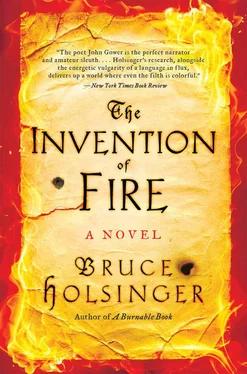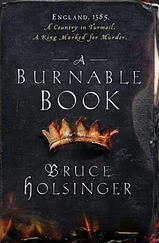Bruce Holsinger - The Invention of Fire
Здесь есть возможность читать онлайн «Bruce Holsinger - The Invention of Fire» — ознакомительный отрывок электронной книги совершенно бесплатно, а после прочтения отрывка купить полную версию. В некоторых случаях можно слушать аудио, скачать через торрент в формате fb2 и присутствует краткое содержание. Год выпуска: 2015, Издательство: HarperCollins, Жанр: Исторический детектив, на английском языке. Описание произведения, (предисловие) а так же отзывы посетителей доступны на портале библиотеки ЛибКат.
- Название:The Invention of Fire
- Автор:
- Издательство:HarperCollins
- Жанр:
- Год:2015
- ISBN:нет данных
- Рейтинг книги:3 / 5. Голосов: 1
-
Избранное:Добавить в избранное
- Отзывы:
-
Ваша оценка:
- 60
- 1
- 2
- 3
- 4
- 5
The Invention of Fire: краткое содержание, описание и аннотация
Предлагаем к чтению аннотацию, описание, краткое содержание или предисловие (зависит от того, что написал сам автор книги «The Invention of Fire»). Если вы не нашли необходимую информацию о книге — напишите в комментариях, мы постараемся отыскать её.
The Invention of Fire — читать онлайн ознакомительный отрывок
Ниже представлен текст книги, разбитый по страницам. Система сохранения места последней прочитанной страницы, позволяет с удобством читать онлайн бесплатно книгу «The Invention of Fire», без необходимости каждый раз заново искать на чём Вы остановились. Поставьте закладку, и сможете в любой момент перейти на страницу, на которой закончили чтение.
Интервал:
Закладка:
“No, you never did, Sanders.”
“A wheelwright, and never a rounder wheel did a man make.” He went on about his brother the wheelwright, and in great detail, as we crossed the river: the carving, the tooling and lathing, the sanding and painting. One of those watermen who likes to jaw his way from bank to bank. We made small gossip as I feigned interest in everything the fellow had to say. It was an oddly welcome relief from the growing peril around me.
When we bumped up below the Fleet spill I paid the boatman, then walked along the ditch and up toward Smithfield. I took a winding route through the upper end of the market and skirted the ditch all the way to Bishopsgate, at this time of day the busiest portal into the city. Once through the walls I dodged west, avoiding Cornhill and the Mercery to approach the Guildhall from the north. From the yard I made for one of the detached buildings spaced along the western side of the hall.
The structure had been shuttered against the cold, though the central room was well lit, with numerous lamps and candles clustered to illuminate the work of the men within. The Guildhall scriveners were a quiet and industrious bunch, hived like bees in their cells at triangular writing desks positioned along the chamber’s spine. There were nine scribes working at any one time, with three to a desk, each given particular tasks identifiable in several cases from the documents stacked or set to their side: court rolls, summonses, account books, writs of various kinds. At the middle desk, his back to the doorway, sat the man I needed.
“Pinkhurst,” I said.
The scrivener looked up and half turned. When he saw me his pied face arranged itself into an arch and lofty regard. He had been expecting me.
“What is it, Gower?” he said. The others paid us little mind.
“May I speak to you, just out here?”
He looked down at his work, loudly sighed, then stood and shuffled out the door.
“What is it you want?” said Pinkhurst when we had reached the corner of the building. “As Master Chaucer knows, I’ve enormous amounts of work to do. Commissions from poets must be the lowest of my priorities for the time being.”
One poet excepted, he didn’t need to say. From everything Chaucer had told me, Pinkhurst’s copying for him in recent years had been prompt and reliable, with little delay caused by the press of work for the city, crown, and guilds. Rather young, yet with a steady hand at the quill, the scrivener had already established himself as an invaluable scribal asset for numerous parties, keeping accounts for the mercers’ guild and the wool custom while working doggedly for the Guildhall. Though written on parchment, however, what I hoped to ply from the scrivener that morning had nothing to do with poetry.
“I am here not for your services, Pinkhurst, but for your safety.”
“As I told you, I am quite busy,” he said, ignoring my darker implication. “Exton’s swearing-in is tomorrow. We have numerous writs of appointment to complete, notarizations to effect, and the courts will begin again in two days’ time.”
“This matter concerns our lesser king.” I tilted my head toward the Guildhall, knowing he would gather my meaning. According to Chaucer, Pinkhurst secretly despised Brembre, a hatred I hoped to exploit.
He sucked in a cheek. “What is it, then?”
“I think you know.”
He looked genuinely puzzled. “Do I?”
“A record of interrogation,” I said. “A swerver was questioned here at the Guildhall. You were the scribe.”
The lighter patches in his face paled further. “That record is not here, whatever Chaucer may have told you.”
“Chaucer knows nothing about this, nor shall he.”
“Nor do I. The record was seized.”
I gave him a long and deliberate stare. “I hadn’t believed it of you, Pinkhurst. That you would jeopardize Lady Idonia in such a callous way.”
He frowned, his lower lip jutting from his mouth. “What does this have to do with her ?”
I told him what I knew about the record’s fate once it had left his hands. The mayor’s chest, Idonia’s letter, its interception by an agent of the duke. He looked at me, disbelieving. “So Lady Idonia used-”
“Yes,” I said. I watched his young eyes crinkle in indignation. “Your admiration for the mayor’s wife is well known, Adam.”
Pinkhurst squirmed.
“I hope you will reconsider what you have told me. The record has come into Gloucester’s hands since the killings. How I don’t know, but the fact is, the duke now possesses immensely damaging information on the mayor, and has been using it to twist him in the wind. If he makes it public, Brembre will suffer a great fall, and even greater embarrassment.” I waited, then, “As will Lady Idonia.”
Pinkhurst’s eyes were now directed at the pavers between the two buildings. “I have heard whisperings of Idonia’s discontent these last weeks,” he said. “You can see it on her fair face, in her manner when she walks to and from her house. I cannot imagine what she is enduring. The blame, the fury, the humiliation . . .”
“And they will only increase should Gloucester use what he has, Adam.”
“Yes,” said Pinkhurst absently.
I let him think about it, then spoke to him gently. “You made a copy, didn’t you?” A guess, but a sound one based on what I knew of the man’s habits.
He closed his eyes.
“You still have it?” I said, confident in the answer. When he shook his head my heart dropped like a stone; then he blurted out, “I kept the original.”
“What’s that?”
“After the interrogation of Rykener I made a copy of the confession,” he said, now in a low and urgent whisper. “The sheriffs were terrified of what Sir Nick would do if he got wind of it, so they asked me to make an additional copy for safekeeping, while giving the original to the keeper of the rolls for inscription. Instead I switched them. The original has her-his-the swerver’s mark on it, as well as the seal of the mayor’s own recorder. I made a rough copy of the confession, without the documentary trappings of signs and seals. That copy is the one the mayor seized when he stormed into the recorder’s office and took it from my hand.”
“So that copy is the record that Gloucester has used to force Brembre’s hand.”
He nodded tightly, a somewhat proud smile above his ugly. “The copy was good enough to deceive the duke, it seems. Yet nothing would be easier to forge. The original was in my own hand, after all.”
“You must surrender it to me, Adam.”
He shook his head. “If it gets out that I gave the mayor a falsified copy rather than the sealed original-”
“Why then you will be the mayor’s savior.” His eyes widened in bewilderment. “Think of it. Who had the foresight to make a feigned copy and preserve the damning original safe from harm? Why, Adam Pinkhurst. And all along the mayor has been terrified that Gloucester would use the original record to question his natural manhood before the eyes of London.”
His lips tightened.
“I will pay you any price you name, Pinkhurst. For the record and your discretion.”
“My discretion cannot be bought, Gower.” He looked offended. “It comes with the service I provide, as much a part of my copying as the gall scratched from my pen. What I copy I keep close, and always have.”
“Then consider this a payment for a very fine piece of parchment in your possession.”
Pinkhurst looked at the heavy purse dangling from my fingers. He took it, weighed it in his hand, then turned silently for the scriveners’ building. Before long he came out, a document in his hand. He put it in mine. I put on my spectacles and examined the interrogation. The recorder’s seal, the swerver’s mark, the names and stations of other magnates identified by Eleanor Rykener as her jakes. I flipped it. The overleaf was blank. No letter from Idonia.
Читать дальшеИнтервал:
Закладка:
Похожие книги на «The Invention of Fire»
Представляем Вашему вниманию похожие книги на «The Invention of Fire» списком для выбора. Мы отобрали схожую по названию и смыслу литературу в надежде предоставить читателям больше вариантов отыскать новые, интересные, ещё непрочитанные произведения.
Обсуждение, отзывы о книге «The Invention of Fire» и просто собственные мнения читателей. Оставьте ваши комментарии, напишите, что Вы думаете о произведении, его смысле или главных героях. Укажите что конкретно понравилось, а что нет, и почему Вы так считаете.












